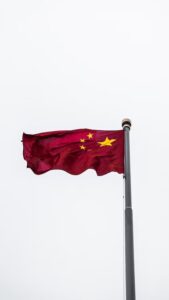In recent years, Beijing’s influence in various spheres has been rapidly expanding, with the United States now becoming a key target for their ambitious quest for dominance. While military and economic competitions between the two powers often take center stage, Beijing’s strategic efforts to conquer the US cognitive sphere should not be overlooked. Through carefully crafted strategies and tactics, Beijing aims to shape narratives, control information flows, and influence public opinion, ultimately challenging the cultural dominance enjoyed by the United States for decades.
Beijing’s Ambitious Quest: Dominating US Cognitive Sphere
Beijing’s ambitious quest to dominate the US cognitive sphere is a multi-faceted endeavor that involves a range of strategies, from traditional media to cutting-edge technology. One significant aspect of this quest is the Chinese government’s control over the domestic media landscape, which allows them to project their preferred narratives and shape public opinion. Through state-owned media outlets such as Xinhua and CGTN, Beijing can amplify its own voice, while also suppressing dissenting perspectives and spreading propaganda.
aspect of this quest is the Chinese government’s control over the domestic media landscape, which allows them to project their preferred narratives and shape public opinion. Through state-owned media outlets such as Xinhua and CGTN, Beijing can amplify its own voice, while also suppressing dissenting perspectives and spreading propaganda.
Beijing has not shied away from utilizing social media platforms to further its cognitive dominance agenda. Chinese state-sponsored actors have been known to engage in coordinated social media campaigns aimed at disseminating their preferred narratives and suppressing alternative viewpoints. By strategically deploying bots and trolls, Beijing can manipulate online conversations, creating an illusion of consensus that supports their own agendas while marginalizing dissenting voices.
 The Battle of Minds: Beijing’s Strategy in US Cultural Dominance
The Battle of Minds: Beijing’s Strategy in US Cultural Dominance
Beijing’s strategy in conquering the US cognitive realm also involves leveraging its rich cultural heritage and soft power. The Chinese government has made significant investments in promoting its language, history, and traditional arts, such as calligraphy and martial arts, in the United States. By doing so, Beijing aims to shape cultural narratives and foster a favorable perception of China among US citizens. This approach not only helps Beijing to project a positive image but also challenges the dominant narrative that has long been associated with American cultural influence.
Educational institutions are a prime target. Beijing is increasingly focusing on expanding its influence in academia and research institutions in the United States. Through investments in Confucius Institutes and other educational programs, Beijing aims to shape the discourse on China-related issues and control the narrative in academic circles. This influence allows Beijing to not only shape the perception of China among scholars and researchers but also influence policy decisions and public opinion on matters related to China.
Unveiling the Rise: How Beijing is Conquering the US Cognitive Realm
Beijing’s rise to conquer the US cognitive realm can be attributed to its comprehensive and well-executed strategies. By carefully studying and adapting to the US media landscape, Beijing has effectively tapped into various platforms to disseminate its narratives. This includes not only traditional media but also social media, where state-sponsored actors manipulate conversations to their advantage.
Beijing’s investment in cultural promotion and educational institutions has helped shape narratives and influence public opinion at a deeper level. By challenging the dominant cultural narrative associated with the United States, Beijing is gradually expanding its cognitive influence and pushing its own agenda.
 One of the most prominent examples of this is the rise of Chinese films in international markets. Previously known for martial arts and period dramas,
One of the most prominent examples of this is the rise of Chinese films in international markets. Previously known for martial arts and period dramas, Chinese filmmakers have expanded their repertoire to include a diverse range of genres, capturing the attention of audiences worldwide. With the phenomenal success of films like “Crouching Tiger, Hidden Dragon” and “Wolf Warrior,” Beijing has demonstrated its ability to produce high-quality movies that resonate with both domestic and international audiences, challenging the dominance of Hollywood in the global film industry.
Chinese filmmakers have expanded their repertoire to include a diverse range of genres, capturing the attention of audiences worldwide. With the phenomenal success of films like “Crouching Tiger, Hidden Dragon” and “Wolf Warrior,” Beijing has demonstrated its ability to produce high-quality movies that resonate with both domestic and international audiences, challenging the dominance of Hollywood in the global film industry.
Another aspect of China’s expanding cultural dominance is the proliferation of Chinese television shows. With the advent of streaming platforms, Chinese dramas have gained popularity beyond the borders of China, reaching audiences in countries such as the United States. These shows offer a unique insight into Chinese culture and society, presenting a perspective that may differ from the Western narrative. By capturing the attention of global viewers, Beijing is not only promoting its cultural products but also influencing the way people perceive China, contributing to the reshaping of the global cultural narrative.
Beijing’s Drive: Conquering US Cognitive Sphere 
As Beijing’s influence continues to expand, its quest to conquer the US cognitive sphere becomes increasingly apparent. Through a combination of media control, social media manipulation, cultural promotion, and academic influence, Beijing is strategically positioning itself to challenge the long-standing dominance enjoyed by the United States in shaping global narratives. As the battle for cognitive dominance intensifies, it is crucial to remain vigilant in understanding the various tactics employed by Beijing and the potential implications for the future of global discourse.
